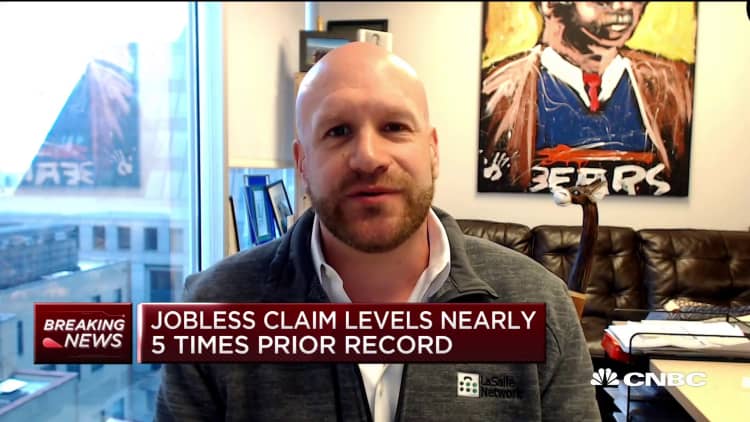With the coronavirus shutting down the U.S. economy and no reasonable way to know when the public health crisis will relent and the business world will get back to full speed, this could quickly become the worst hiring season for new college graduates since the 2007–2008 financial crisis.
Claire Bradshaw, a graduating senior at the University of Missouri-Columbia studying journalism, was confident just one month ago about nailing an anchor or reporting position at a local station before or soon after graduation. But two weeks ago newsroom recruiters started canceling their visits to the university. The following week, news directors sent emails to students confirming that hiring had been put on hold until everything settles.
"So many Mizzou seniors get jobs from the weekly recruiter interviews," Bradshaw said. "This is how we start to build up our network and start our careers."
Publishers, specifically, are facing advertising declines and tighter budgets. Earlier this week, BuzzFeed announced salary cuts across its operations, including its CEO. And other small publishers are warning about financial trouble.
"I am worried about not finding a job, because we've never experienced an event like this," said Leo Rocha, another senior at the University of Missouri-Columbia studying journalism.
JOIN @Work: Join CEOs and experts including Arianna Huffington, Lazlo Bock and John Chambers for an interactive discussion on leadership and management amid this unprecedented crisis at the CNBC @Work Virtual Summit on April 2 at 12pm ET. For a full agenda and details, visit CNBCevents.com.
The beginning of the year was off to a strong start for the economy and job market, with employers adding 273,000 jobs in February and the unemployment rate remaining low, according to the Labor Department. This week the largest jobless claims ever was recorded in the U.S., with more than 3 million workers filing for unemployment.
After the 2008 financial crisis, hiring had been steady for the past decade, including for college graduates. Between 2017 and 2019, jobs for new graduates posted on the Handshake platform — which is like a "LinkedIn for colleges" connecting campuses to companies — increased by 11% per year, indicating steady growth in entry-level recruiting, according to Handshake.
"The job search for 2020 graduates is going to be different," said Christine Cruzvergara, vice president of higher education and student success at Handshake. "It's not going to be what their peers had experienced even just a year ago or five years ago."
How schools are responding
Universities and colleges' career center services are remaining cautiously optimistic.
Christian Garcia, executive director at Toppel Career Center at the University of Miami, said it will be a different and possibly challenging hiring season for graduates, similar to 2008, but he is confident that career counselors like him learned from the 2008 experience. "We saw a lot of students just gave up in 2008. Now I am preparing my staff to get ahead of that," he said. "Yes, it might be tough, but there are a lot of tools students have on their side, especially technology, freelance and gig jobs."
The University of Miami and Santa Clara University are creating virtual alternatives to their spring career fairs for students and employers. Santa Clara University still had all of their employers in the queue, so they are taking this opportunity to organize a virtual resume drop, said Rose Nakamoto, director of the school's career center. Students can drop their resumes with employers and still have the chance to interview and connect virtually.
Our greatest challenge right now, beyond just the initial panic and anxiety about college students getting jobs, is really the mismatch between talent and where the sudden industry needs are.Dr. Farouk Deyvice provost for integrative learning and life design at John Hopkins University
The University of Miami usually pairs with a few other universities in the area to host a spring career fair, where more than 150 companies attend. Instead of canceling the career fair, it will be held virtually. Students will preregister and be able to set up online appointments with recruiters or go to each booth virtually and learn about the companies. For the first time, the university will also host a summer career fair.
"Our greatest challenge right now, beyond just the initial panic and anxiety about college students getting jobs, is really the mismatch between talent and where the sudden industry needs are," said Dr. Farouk Dey, vice provost for integrative learning and life design at Johns Hopkins University.
Where the jobs are
Amazon is hiring an additional 100,000 warehouse and delivery employees to meet the demand of online shopping as many Americans are forced to stay at home, and Walmart and other essential needs providers are also seeing need for a new, massive influx of workers to meet online order and delivery demand. Walmart and Kroger have already hired tens of thousands of new workers, with Walmart bringing on 25,000 in one week and plans for 150,000 total.
According to Challenger, Gray & Christmas, the oldest outplacement services firm in the U.S., there have been 129,000 hiring announcements from individual companies so far in March, mainly from grocery stores and retailers racing to keep up with demand. In addition to retailers, Pepsi is hiring 6,000 people and Domino's is hiring 1,000 new delivery drivers. Meanwhile, GE and 3M, which manufacture much needed health-care products, are ramping up production and will likely need to increase shifts and workers.
"Companies are definitely still hiring right now. The methods may be a bit unusual, as companies are prioritizing speed during the hiring process," said Challenger in a release on Friday.
But other sectors have come to a halt.
"There's been a big decline in the trend of job posting in hospitality, tourism and aviation, but we have seen a big increase in job postings in warehouse and grocery workers," said Jed Kolko, chief economist at Indeed. The problem, as Kolko noted, is that these new jobs are ones "college graduates are not necessarily looking for."
Kolko said big and booming tech companies are probably still hiring, though Indeed is still collecting data on what is occurring across the economy. The rise in telecommuting and remote work likely means opportunities for college graduates with the right set of skills. "Companies like Zoom, Microsoft and Slack are thriving right now, so they will probably continue hiring engineers, programmers and customer service support," said Johns Hopkins' Dey. "But those aren't every graduate's interests."
"I think after graduation when I move back home, I will probably have to nanny while job hunting," said Natalie Pecora, a senior at Miami University in Ohio. Pecora is a strategic communications and health marketing major who has been looking for jobs in public relations or social media management. She was communicating with three companies seriously, but they recently told her they are putting their hiring on hold indefinitely. She hasn't heard from these companies in nearly four weeks.

Students will have to change their job-search process, explained Cruzvergara. Handshake has been helping their partners, 900 universities and colleges around the country, realize many of the tools students were already beginning to use can be enhanced during this time. "Through our research, when a student completes and fills out a minimum of three sections, they're 80% more likely to get a message from an employer," she said.
University of Miami, Santa Clara University and Johns Hopkins University have all moved their career services and life design online. Students can schedule an appointment with a staff member, as they would on campus, and discuss the next steps in their career. Students might not get a job right out of college, but there are other options, said Garcia. "One of the things we're really pushing on students is micro internships," he said. "These are opportunities to craft your skills while getting paid, and you are still eligible to participate after you've graduated."
Dey said there could be a raise in students going to graduate school rather than straight to the work. "In 2001 and 2008, times of financial crises, grad school applications increased. Students aren't making revenue, and this is a way for them to better themselves, Dey said. So I think we are going to see that in the next few years."
Handshake's Cruzvergara said it is not time to panic but a time to prepare, which includes refining their online presence and its professional aspects. "Students should focus on their digital brand, digital shadow and digital engagement," she said. A student's digital brand includes how they represent themselves online to present the professional they want to be now and in the future, Cruzvergara said. A digital shadow is what a company will find when they Google potential hires, which should align with a professional brand. Digital engagement includes how new graduates engage on social platforms.
"This is a time for students to redefine what success means to them," Nakamoto said. "The path ahead will likely look different than what they expected, so consider alternate plans and cultivate multiple paths of possibility proactively."






